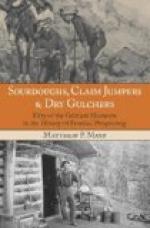Once he was well settled in his new home, and the first excitement of novel impressions had worn off, Bennington de Laney began to write regularly three hours a day. He did his scribbling with a fountain pen, on typewriter paper, and left a broad right-hand margin, just as he had seen Brooks do. In it he experienced, above all, a delightful feeling of power. He enjoyed to the full his ability to swing gorgeous involved sentences, phrase after phrase, down the long arc of rhetoric, without a pause, without a quiver, until they rushed unhasting up the other slope to end in beautiful words, polysyllabic, but with just the right number of syllables. Interspersed were short sentences. He counted the words in one or the other of these two sorts, carefully noting the relations they bore to each other. On occasions he despaired because they did not bear the right relations. And he also dragged out, squirming, the Anglo-Saxon and Latin derivations, and set them up in a row that he might observe their respective numbers. He was uneasily conscious that he ought, in the dread of college anathema, to use the former, but he loved the many-syllabled crash or modulated music of the latter. Also, there was the question of getting variety into his paragraph lengths. It was all excellent practice.
And yet this technique, absorbing as it was, counted as nothing in comparison with the subject-matter.
The method was talent; the subject-matter was Genius; and Genius had evolved an Idea which no one had ever thought of before—something brand new under the sun. It goes without saying that the Idea symbolized a great Truth. One department, the more impersonal, of Bennington’s critical faculty, assured him that the Idea would take rank with the Ideas of Plato and Emerson. Emerson, Bennington worshipped. Plato he also worshipped—because Emerson told him to. He had never read Plato himself. The other, the more personal and modest, however, had perforce to doubt this, not because it doubted the Idea, but because Bennington was not naturally conceited.
To settle the discrepancy he began to write. He laid the scene in Arabia and decided to call it Aliris: A Romance of all Time, because he liked the smooth, easy flow of the syllables.
The consciousness that he could do all this sugar-coated his Wild Western experiences, which otherwise might have been a little disagreeable. He could comfort himself with the reflection that he was superior, if ridiculous.
In spots, he was certainly the latter. The locality into which his destinies had led him lay in the tumultuous centre of the Hills, about thirty miles from Custer and ten from Hill City. Spanish Gulch was three miles down the draw. The Holy Smoke mine, to which Bennington was accredited, he found to consist of a hole in the ground, of unsounded depth, two log structures, and a chicken coop. The log structures resembled those he had read about. In one of them lived Arthur and his wife. The wife did the cooking. Arthur did nothing at all but sit in the shade and smoke a pipe, and this in spite of the fact that he did not look like a loafer. He had no official connection with the place, except that of husband to Mrs. Arthur. The other member of the community was Davidson, alias Old Mizzou.




